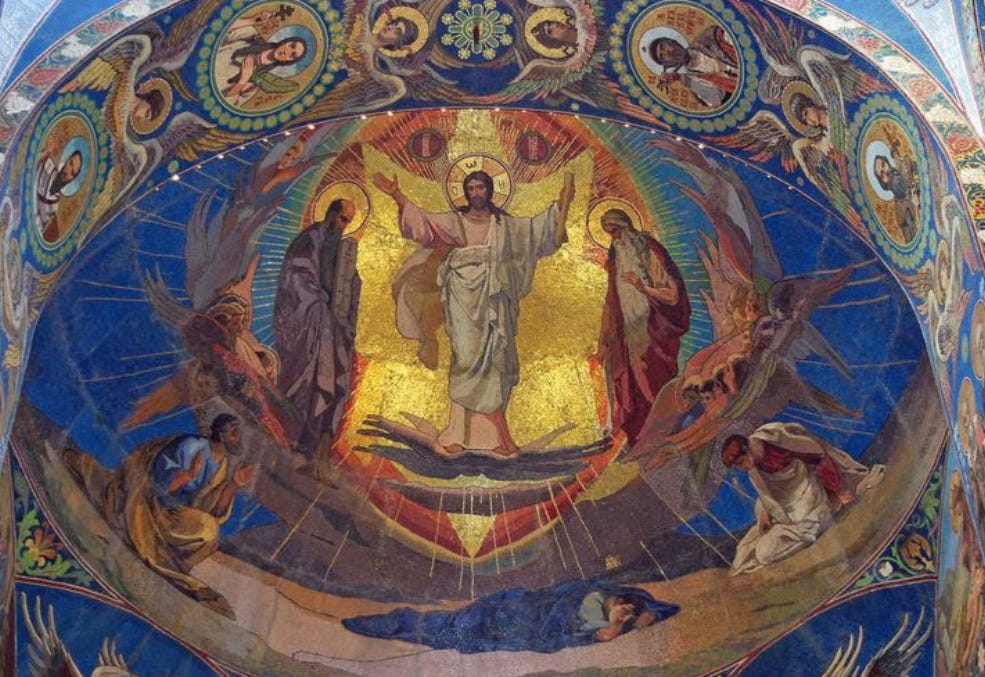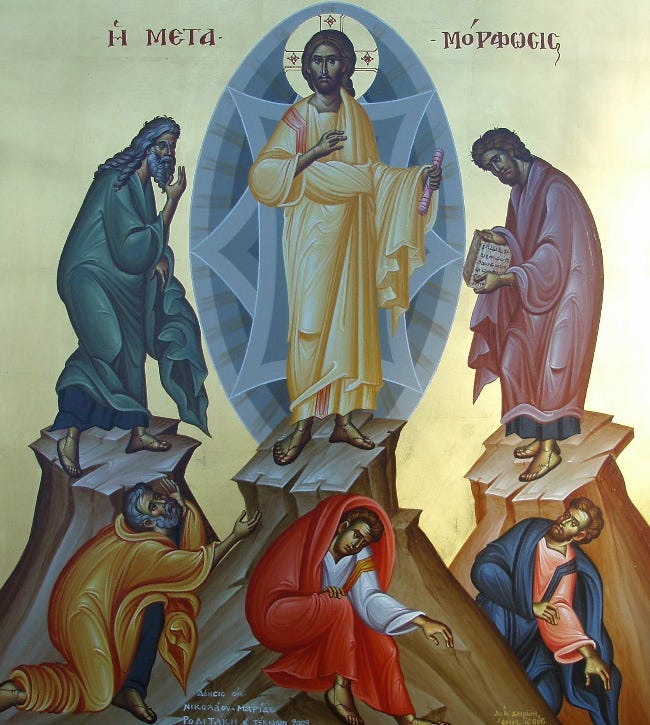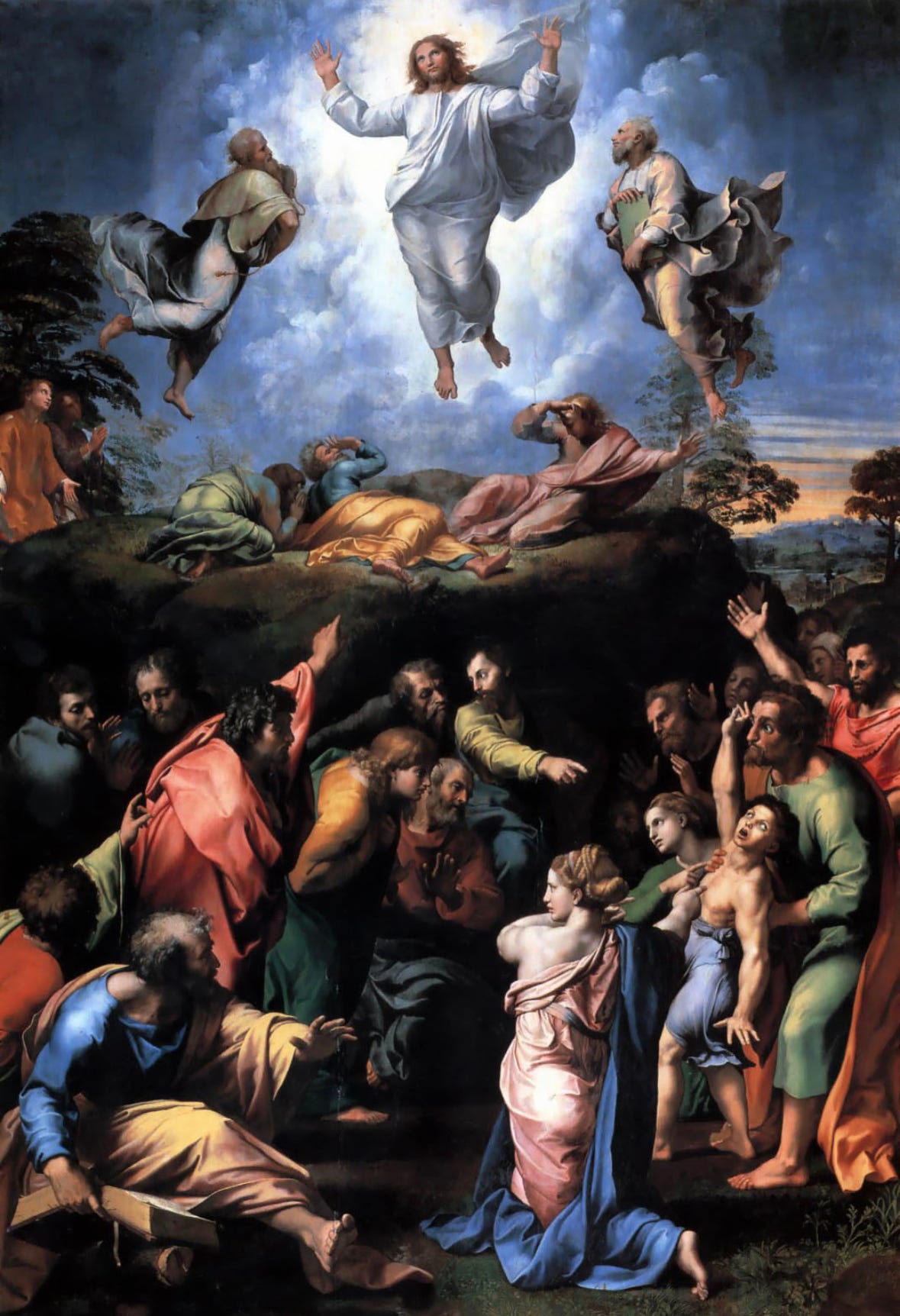“And it came to pass about eight days after these words, that he took Peter, and James, and John, and went up into a mountain to pray. And whilst he prayed, the shape of his countenance was altered, and his raiment became white and glittering. And behold two men were talking with him. And they were Moses and Elias, appearing in majesty.” —Luke 9:28-31
Today is the feast of the Transfiguration of Jesus Christ, when Jesus’s three closest friends beheld a glimpse of His Divine Glory and God the Father called upon the stunned apostles to listen to Christ, His Son.
Below is St. Matthew’s account of the Transfiguration (17:1-9):
“And after six days Jesus taketh unto him Peter and James, and John his brother, and bringeth them up into a high mountain apart: And he was transfigured before them. And his face did shine as the sun: and his garments became white as snow. And behold there appeared to them Moses and Elias talking with him. And Peter answering, said to Jesus: Lord, it is good for us to be here: if thou wilt, let us make here three tabernacles, one for thee, and one for Moses, and one for Elias. And as he was yet speaking, behold a bright cloud overshadowed them. And lo, a voice out of the cloud, saying: This is my beloved Son, in whom I am well pleased: hear ye him.
And the disciples hearing, fell upon their face, and were very much afraid. And Jesus came and touched them: and said to them, Arise, and fear not. And they lifting up their eyes saw no one but only Jesus. And as they came down from the mountain, Jesus charged them, saying: Tell the vision to no man, till the Son of man be risen from the dead.”
Sts. Peter and John both hark back to that awesome spectacle in their New Testament writings. The Second Epistle of St. Peter, verses 16 to 20, describes how the Transfiguration confirmed Peter’s faith in Christ:
“For we have not by following artificial fables, made known to you the power, and presence of our Lord Jesus Christ; but we were eyewitnesses of his greatness. For he received from God the Father, honour and glory: this voice coming down to him from the excellent glory: This is my beloved Son, in whom I am well pleased; hear ye him. And this voice we heard brought from heaven, when we were with him in the holy mount. And we have the more firm prophetical word: whereunto you do well to attend, as to a light that shineth in a dark place, until the day dawn, and the day star arise in your hearts: Understanding this first, that no prophecy of scripture is made by private interpretation.”
St. John’s recollection is less detailed but more mystical, as his writings so often are. He wrote (Jn. 1:14), “And the Word was made flesh, and tabernacled among us, (and we saw his glory, the glory as it were of the only begotten of the Father,) full of grace and truth.”
Jesus showed Himself thus to the disciples because, all too soon, He would suffer and die on the cross. Peter, James, and John were to remember the Transfiguration when Jesus was arrested and it seemed as if His life would end too soon in a pointless and horrific death. Yet only John remained with Jesus throughout the Passion, and all the apostles seemed surprised by Jesus’s Resurrection. Jesus had actually told them He would rise from the dead, just after being transfigured, and they still couldn’t quite believe!
But isn’t that true of almost all of us? When a young person or beloved parent dies suddenly, or something we worked very hard for is unjustly taken away from us, or there is persecution or war, we begin to wonder if there is a God and if virtue is worth it. Peter, James, and John no doubt wondered that during Jesus’s Passion, but after Jesus’s Resurrection they fearlessly went forth to face persecution and death—keeping in mind the Transfiguration.
No one receives completely perfect justice in this life; most people suffer unjustly, and some seem never to receive justice. Every person likewise suffers tragedy in his life, and some suffer very greatly. Whether our sufferings and misfortunes are small or great, we must remember always—especially when everything seems most miserable and hopeless—that this life is not the end, and that those who stay faithful to God receive eternal glory after death.
No matter how powerful evil seems in this life, there is another life to come where we will receive unfading crowns (1 Pet. 5:4, 2 Tim. 4:8); this we know because we have seen His glory, the glory of the Only-Begotten of the Father, full of grace and truth.






